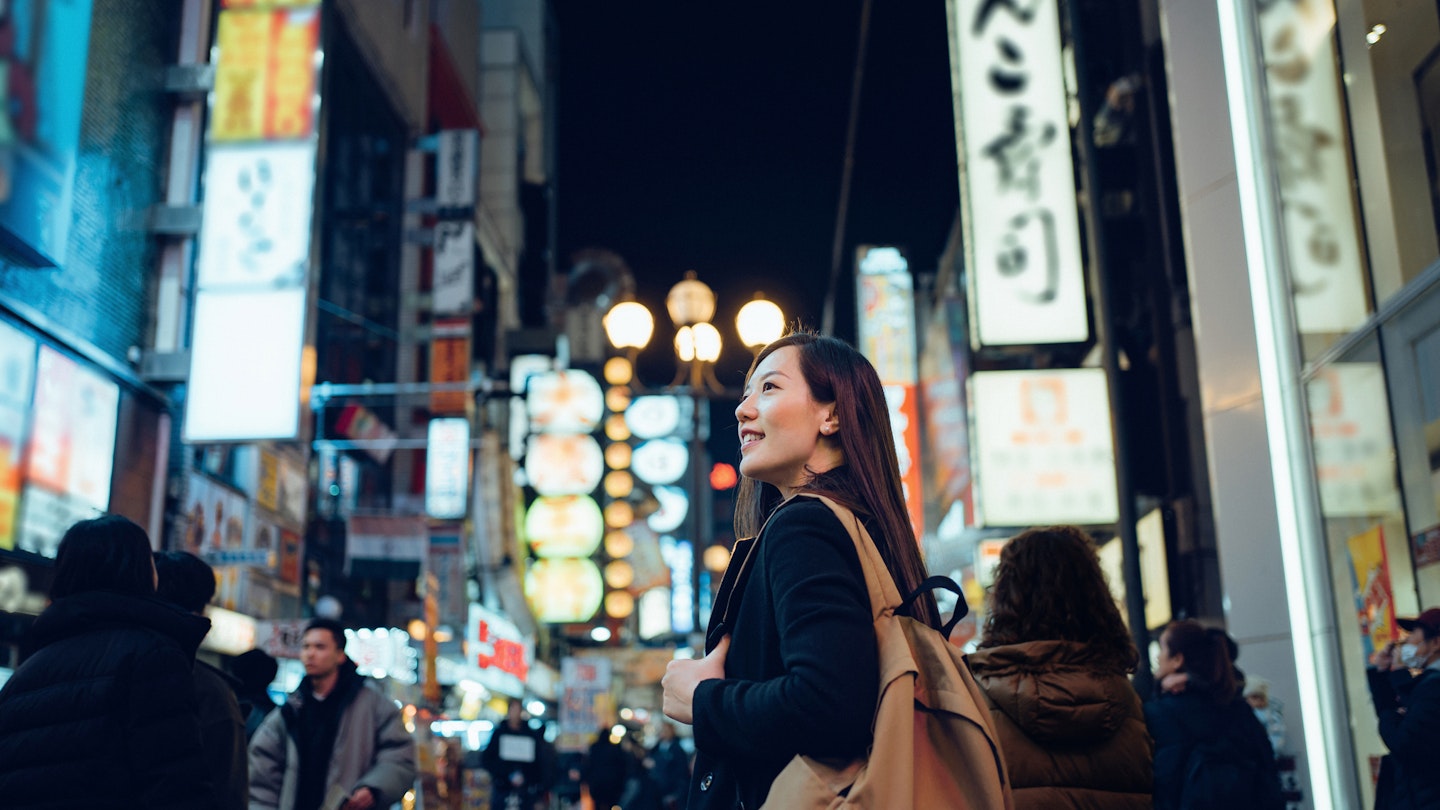
Everything you need to know about Japanтs visa requirements

Nov 11, 2024 тЂ 9 min read

Visitors from 68 countries can travel to Japan with a free visa on arrival ТЉ d3sign / Shutterstock
With its pulsing, modern cities, beautiful rural landscapes and world-renowned cuisine, Japan is one of the top stops for travelers seeking a fully immersive Asian experience.
And there's good news: travelers from most countries donтt need a visa to visit Japan.
Read on for a rundown of Japanтs latest entry requirements, and consult Japanтs for the most up-to-date information ahead of your travels.

Do you need a visa to go to Japan?
As of the most recent guidance, released in April 2024, residents of 71 countries can enter Japan for up to 90 days with a free tourist visa upon arrival (with a valid passport); this is considered a visa exemption. These countries include the UK, USA, Canada, Mexico, Australia, Singapore, Malaysia, and most European countries. For a complete list of visa-exempt countries and visa durations, consult the .
On entering Japan, all holders of foreign passports are photographed and fingerprinted. If asked, travelers arriving with a visa upon arrival should be able to provide proof of onward travel or sufficient means to purchase an air or ferry ticket out of Japan. In practice, this is rarely requested. Your passport should also be valid for the proposed duration of your stay. When returning home, if you have reported your passport as lost or stolen, you must apply for a new passport before travel.
How to apply for a visa
Travelers not from a visa-exempt country will need to apply for one via the nearest Japanese embassy in their home nation or organize one with an accredited travel agent approved by the Japanese Embassy.
You will need a visa to enter Japan if youтre a citizen of the Philippines, Vietnam, China, Russia, CIS countries, Ukraine, Georgia, and .
For citizens of Hong Kong, visas are not required for visitors who hold either of these passports: the Special Administrative Region (SAR) passport issued by the Hong Kong SAR of the Peopleтs Republic of China and the British National Overseas (BNO) passport.
The period of stay varies among the non-visa-exempt countries: 15 days for Indonesia and Thailand, 14 days for Brunei, 30 days for the United Arab Emirates and Qatar, and 90 days for other countries.
To apply for a visa, youтll need to provide a valid passport, a visa application form, a copy of your birth certificate, travel details, and a clear passport-size photograph of you. Additional requirements can vary country by country. Check the for all necessary documents.
The general cost of visas is approximately 3,000 yen for a single-entry visa and 6,000 yen for a double- or multiple-entry visa. Fees are collected in the currency of the country in which the embassy is located.
The processing period for visas is five business days from the day after the acceptance of the application. For more information about the requirements of applying for a Japanese visa in specific countries, see the website.

What if I need to extend my temporary visa?
Extending a visa is possible from within Japan for citizens of Austria, Germany, Ireland, Lichtenstein, Mexico, Switzerland and the UK; these travelers may be able to extend their temporary visitor visa once, for another 90 days. Visitors wishing to do this will need to apply at a regional immigration bureau in Japan before the initial visa expires. If approved, the extension fee is 4,000 yen.
For other nationalities, extending a temporary visa is difficult unless you have family or business contacts in Japan who can act as a guarantor on your behalf. Options should be discussed at your nearest regional immigration bureau.
Types of visas
Japan has several types of work or long-term stay visas, depending on the purpose of your travel. The main categories include general, highly skilled professional, working, specified, start-up, diplomatic, and official visas. Here are a few things to remember:
The applicant must make a visa application via the nearest Japanese Embassy/Consulate in their home nation or through an accredited travel agent that the Japanese Embassy/Consulate has approved.
The documents needed for the visa application will vary. In some cases, documents prepared by the inviting person in Japan are required in addition to the applicantтs documents.
Apply for the visa well in advance. While the processing time is typically 5 days, if there is an issue, the application is sent from the Embassy/Consulate General to the Ministry of Foreign Affairs in Tokyo for further examination. In this instance, approval could take more than a month.
You can apply online using the .
General visas
General visas are separated into four categories: cultural activities, student, training, and dependent (family stays). These grant entry for three years, one year, six months or three months. Here are examples of these visas:
Cultural activities visa: meant for those with unpaid internships, studying the tea ceremony, and studying Japanese floral arrangements, to name a few.
The student visa: meant for college students or pre-college students.
The training visa: for trainees in local government.
The dependent visa: for the spouse and children of a foreign national with a working visa.
Highly skilled professional visas
A is for someone admitted into Japan on or before March 31, 2015, with a тdesignated activitiesт residence status. These professionals have outstanding abilities or credentials in one of the following three categories: advanced academic research activities, advanced specialized/technical activities, and advanced business management activities. A points-based system determines eligibility for the highly skilled professional visa, and candidates are evaluated on academic background, professional experience, salary and age.
This visa aims to attract top-tier professionals to Japan and give them a smoother path to integrating themselves into the Japanese workforce and society.
The professionalтs spouses and children can apply for a general visa as dependents. A spouse who intends to work in Japan, the professionalтs parents or their household employees can apply for the designated activities visa.
Working visas
Longer, are also available to visitors of Japan, which allow people to study, train or work in the country. These usually grant entry for either three years, one year, six months or three months. These visas must be applied for in advance of travel, via an embassy in your country of origin.
Here are a few examples of professions that can apply for this visa:
Professor: university professor, assistant professor
Artist: composers, songwriters, artists, sculptors, craftspeople, photographers
Religious activities: religious people such as monks, bishops, missionaries
Journalist: journalists, editors, news camera operators, announcers
Business manager: company presidents, directors
Legal/accounting services: attorneys, judicial scribes, public accountants, tax accountants, etc. certified in Japan
Medical services: physicians, dentists, pharmacists, nurses, etc. certified in Japan
Researcher: researchers, investigators
Instructor: teachers at elementary, intermediate and high schools
Engineer/Specialist in humanities/International services: scientific engineers, IT engineers, foreign language teachers, interpreters, copywriters, designers
Intra-company transferee: people transferred to the Japanese branch (head office of the same company, etc.)
Nursing care: certified care worker
Entertainer: musicians, actors, singers, dancers, athletes, models
Skilled labor: chefs specializing in the food of a foreign country, animal trainers, pilots, sports trainers, sommeliers
Specified skilled worker: work-ready foreign nationals who possess certain expertise and skills in certain industrial fields
Technical intern training: technical intern
Working holiday visas
The specific allows visitors to engage in small-scale employment while visiting the country for tourism purposes. These are available to people between the ages of 18 to 30 (25 in some cases) from 26 countries including Australia, New Zealand, Canada, Korea, the UK and a number of countries in Europe. The number of hours that can be worked and the type of work permitted are limited under this visa.
Specified visas
Within the specified visa category, you can apply for four different types of visas: the spouse or child of a Japanese national visa, spouse or permanent resident visa, long-term resident visa, or designated activities visa. These grant entry for 5 years, 3 years, 1 year or 6 months; however, a number of these can grant entry for a term designated by the Minister of Justice (5 years or less).
Designated activities visa
If you want to work remotely for an extended period in Japan, the designated activities visa is an option. This is considered the тdigital nomadт visa. Here are a few examples of designated activity visas:
Foreign nationals who wish to enter Japan as personal help privately employed by a diplomat.
Foreign nationals who wish to enter Japan for a working holiday or paid internships.
Nurses and care workers who wish to enter Japan based on an EPA
Long stay for sightseeing and recreation.
Individuals wishing to work remotely in Japan for a period not exceeding six months.
Start-up visa
The start-up visa is designed for entrepreneurs supported by municipalities in Japan, as well as the spouse and children of the entrepreneur. This visa grants entry for 6 months.
Diplomatic visa
The diplomatic visa is designed for foreign nationals who receive the Status of Residence of тDiplomatт and are permitted to stay in Japan for the length of тthe mission.т
Official visa
The official visa is designed for those who engage in official business of foreign governments or international organizations recognized by the Government of Japan and their families. This visa grants entry for five years, three years, one year, three months, 30 days or 15 days.

Entry procedures т before you arrive
Ahead of your trip, register at , where you can submit your documentation for customs and immigration, and then download your QR code to your smartphone.
When you arrive in Japan, simply show the QR code when requested during the entry process. According to the Ministry of Foreign Affairs of Japan, residents of the following countries are eligible to apply for a visa online: Australia, Brazil, Cambodia, Canada, Saudi Arabia, Singapore, South Africa, Taiwan, the United Kingdom and the United States.
As you plan your trip, here are 15 things to know before going to Japan.
Things to remember
Apply early to any of the above visas and remember key dates. While these applications are often processed and approved, there is always a chance of rejection, which could delay the process.
Be mindful of the expiration date on your passport, and be sure there is plenty of time for long-term stays before applying. A valid passport is crucial.
Remember that you are visiting a new country that could have a different health care system than your own. Itтs good practice to purchase travel health insurance ahead of your trip.
If you need more information about Japan's tourism, the is a great resource.
Explore related stories

Festivals & Events
The 12 best places to witness the winter solstice in 2024Dec 9, 2024 тЂ 8 min read

 Tips & AdviceJapan vs South Korea: which impressive East Asian destination should you visit?
Tips & AdviceJapan vs South Korea: which impressive East Asian destination should you visit?Nov 19, 2024 тЂ 8 min read
 Tips & AdviceShould you book travel with cash or points? A guide for 2024
Tips & AdviceShould you book travel with cash or points? A guide for 2024Oct 2, 2024 тЂ 13 min read

 Tips & AdviceHow to travel to the Seychelles with points and miles in 2024
Tips & AdviceHow to travel to the Seychelles with points and miles in 2024Aug 21, 2024 тЂ 12 min read




